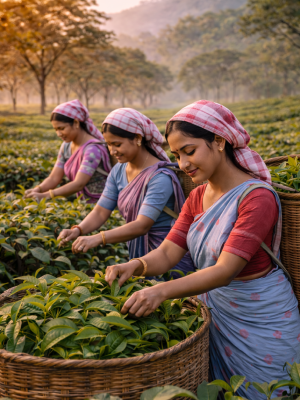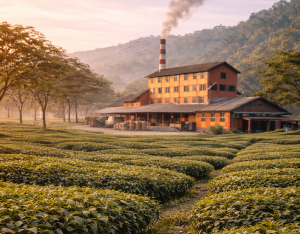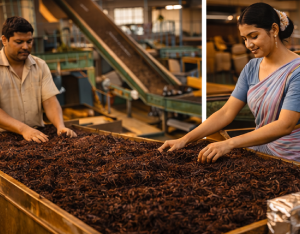



Tea
Industry Assam
Historical Background
The cultivation of tea in Assam dates back to the early 19th century. The British colonial administration initiated commercial tea production in the region after discovering indigenous tea plants in the wild. The first tea gardens were established in the 1830s and Assam soon became a major tea-producing area, with plantations expanding rapidly.
Major Features of Assam Tea
Distinct Flavor
Assam tea is renowned for its strong, brisk and malty flavor, making it a popular choice for black teas and blends, including English Breakfast tea. Varieties: The primary varieties of tea produced in Assam include CTC (Crush, Tear, Curl) and Orthodox tea. CTC is commonly used in tea bags, while Orthodox is known for its whole leaf and higher quality is often used for specialty teas.
Growing Conditions
The unique taste of Assam tea is attributed to the region's climate, characterized by high rainfall, high humidity and warm temperatures, along with fertile alluvial soil.
Economic Significance
Production Volume: Assam is the largest tea-producing region in India, contributing about 50% of the country's total tea production.
Employment
The tea industry is a major employer in Assam, providing jobs to over a million people, including a significant number of women.
Exports
Assam tea is a significant export product, reaching markets worldwide, particularly in the UK, USA and Russia.
Major Tea Growing Areas
Assam's tea gardens are mainly located in two key regions:
Upper Assam
Including districts like Dibrugarh, Tinsukia, Sivasagar and Jorhat which are known for producing high-quality tea.
Lower Assam
Including districts like Barpeta, Nalbari and Goalpara, which are also notable tea-producing areas.
Investment Opportunities
Organic Tea Cultivation
With growing consumer preference for organic products, there is a significant opportunity to invest in organic tea farming and certification.
Specialty Teas
Developing and marketing specialty teas, such as white tea, green tea and flavored teas, to cater to niche market will help in exploring market potential in the tea sector.
Tea Tourism
Developing tea tourism initiatives, including tours of tea estates, heritage tea bungalows and cultural experiences related to tea will help boost tourism.
Branding and Packaging
Investing in innovative branding and attractive packaging to enhance market appeal and command higher prices.
Eco-Tourism
Integrating eco-tourism with tea gardens to attract tourists interested in sustainable and nature-based travel experiences.
Government Support
Incentives and Policies
The Government of Assam offers various incentives, subsidies and support schemes to attract investment in the tea sector.
Infrastructure Development
Initiatives to improve infrastructure, such as better transportation and logistics facilities, support the growth of the tea industry.




